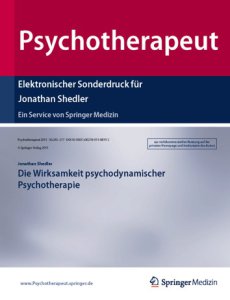Mode of action
In analytical psychotherapy a supporting and stabilizing relationship is built up between the patient and the psychoanalyst. This makes it possible to access traumatic and hurtful experiences in one’s own biography and to understand their significance to one’s current difficulties. In this way the symptoms lose their obtrusiveness and effectiveness, becoming weaker and gradually disappearing.
Psychoanalysis aims at the recovery and lasting stabilization of the patient by giving him deeper insight into what was previously unconscious. Cure and relief by uncovering and processing unconscious conflicts “in the here and now” are the hallmark of psychoanalysis.
By gaining a deeper understanding of himself the patient becomes acquainted with his defence mechanisms which for years have protected him from facing up again to the fears and threats that he has found to be unbearable. For example, “relationship problems” can arise from the fact that we were anxious to please our parents in order to avoid punishment. Or the compulsion to help others is in many cases attributable to a lack of recognition and approval in one’s early years. One now attempts to gain this by following the path of selflessness. Another example can be the separation of one’s own parents: Since children’s emotional capacities for processing such events are still extremely limited, for many this can be an experience that is too painful and disruptive. In later life this dramatic experience can be reflected in the form of unbearable feelings of loneliness or of fears of desertion, as well as of sexual disorders.
People who start psychotherapy have often heard very contradictory information about the effectiveness of psychotherapy. In some cases, treating physicians primarily prescribe psychotropic drugs and see psychotherapy only as a support.
To help you form your own opinion about the current research on the effectiveness of psychotherapy, I offer here a link to a recent publication that presents research findings in a very sound yet clear manner.
Jonathan Shedler (2011): The effectiveness of psychodynamic psychotherapy.
Please click on the journal. Depending on your internet browser settings, the file will either open directly in your browser or download to your computer first. In the second case, you will need to double-click on the downloaded file so that you can read it with a PDF program such as Adobe Reader / Preview / PDF Expert, etc.
An important issue in the context of psychotherapy is the question of efficacy of psychotropic drugs. This is a very complex issue, where I would like to make just one reference here to the problematic efficacy of a particular group of antidepressants: the SSRI Selective Serotonin Reuptake Inhibitors. These SSRIs are also called second-generation antidepressants, and they are supposed to have significantly fewer side effects than the older antidepressants (e.g., tricyclic and tetracyclic antidepressants). However, the entire SSRI group is highly problematic and efficacy is virtually nonexistent compared to placebos. A group of researchers around Irving Kirsch has done very convincing meta-analyses here. If you would like to read the original article by Irving Kirsch on this very exciting meta-study, please click on the following link: Kirsch I, Deacon BJ, Huedo-Medina TB, Scoboria A, Moore TJ, et al. (2008) Initial Severity and Antidepressant Benefits: A Meta-Analysis of Data Submitted to the Food and Drug Administration. PLOS Medicine 5(2): e45.
Very recently, there is a very nice summary presentation (in German) by Dipl.-Psych. Thorsten Padberg from Berlin. In 2018, he presented the current research situation on antidepressants and especially considered the contrast to the public perception of SSRIs. He clearly shows how low the pharmacological efficacy of SSRI antidepressants is to be assessed. If you would like to read the actual article by Thorsten Padberg, please click on the following link: Padberg, T. (2018) Placebos, Drogen, Medikamente Der schwierige Umgang mit Antidepressiva
go to top

